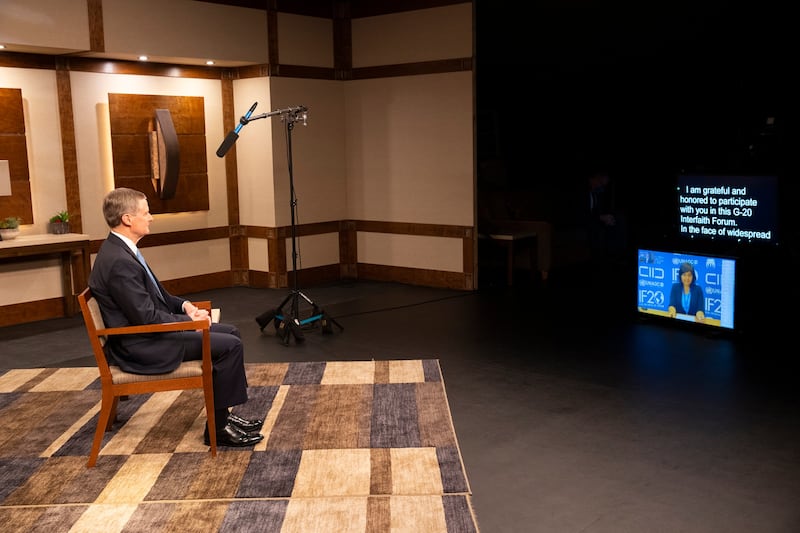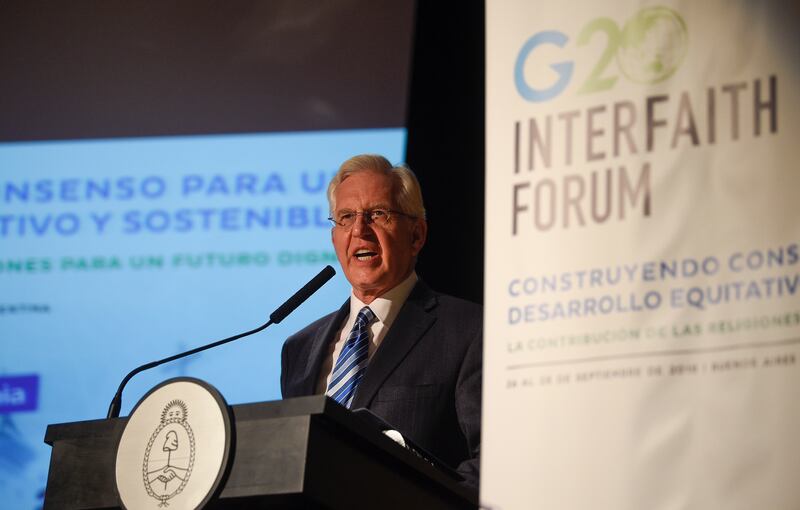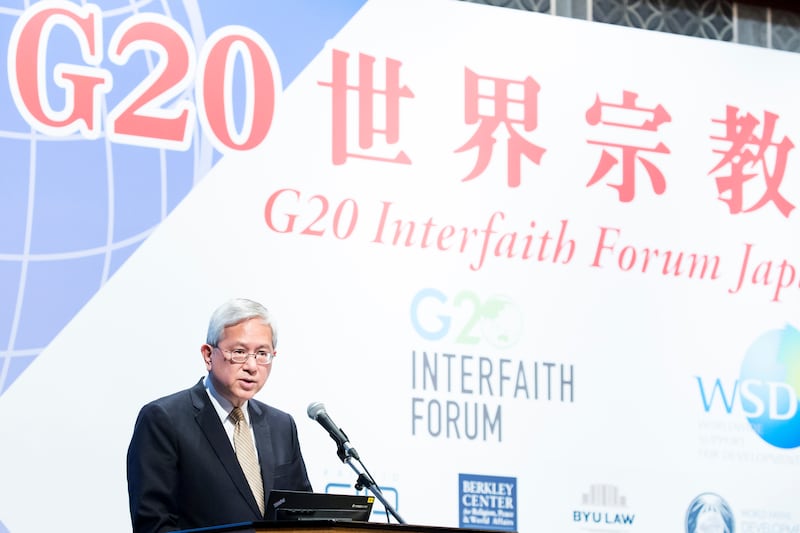Policymakers who didn’t account for the pivotal role of faith in people’s lives contributed to the “crisis of legitimacy” in the response to COVID-19, Elder David A. Bednar said Wednesday during the G-20 Interfaith Forum originating from Riyadh, Saudi Arabia.
Elder Bednar is the third member of the Quorum of the Twelve Apostles of The Church of Jesus Christ of Latter-day Saints to speak at the annual Group of 20 summit in as many years.
“My call is for respect, accommodation and cooperation — for creative solutions that mitigate the threat of COVID-19 while not cutting people off from an essential part of their lives,” said Elder Bednar, who remotely participated in a virtual panel discussion from a studio in the Church Office Building in Salt Lake City.
“In many instances, the lack of such respect has backfired, creating suspicion toward government and the undermining of its legitimate efforts to control the pandemic,” he added.
It was the second time in four months that Elder Bednar has said some government officials have failed during the pandemic to understand, as he said Wednesday, “how and why religion is fundamental to the lives of billions of people.”
He told the G20 plenary session on COVID-19 that he applauded government officials’ sincere efforts to protect people from the coronavirus, saying that “religious activities should be carefully limited when truly necessary to keep people safe.
“No one has a right to spread a dangerous virus,” he said.
“But that is not the end of the matter,” he added. “How secular officials understand religion and religious people deeply influences how they treat religious institutions and believers in a time of crisis. The deeper and more respectful the understanding, the more legitimate and effective public policy responses can be.”

Wednesday’s event is the seventh interfaith forum held before the annual Group of 20 Summit for political and banking leaders from 19 countries and the European Union. The goal is to allow religious communities and experts to help shape the G20’s global policy agendas.
“We are confident that the best answers will not be found without listening to religious voices, and to sensitive experts often well placed to help translate religious insight into practical policy initiatives,” said Cole Durham, president of the G20 Interfaith Forum Association, in a welcome letter to this week’s forum.
The interfaith forum’s theme is “Realizing Opportunities of the 21st Century for All.”
Elder Bednar said religion is a defining core identity for billions who rely on faith for strength, consolation and hope. It also transmits moral and social truths.
“Our faith is more than just important to our dignity as human beings,” he said. “It is essential.”
Responsible religious communities did not seek to disregard the risks of COVID-19 or disregard public policy to mitigate its spread, but religious freedom under international law cannot be abrogated, even in an emergency: “To deny such freedom is to deny something fundamental to a believer’s soul,” Elder Bednar said.
Blanket bans on religious gatherings risk strong connections to family, religious beliefs and faith communities that are associated with better mental, emotional and physical health, he said, adding that experts have documented rises in depression, physical and emotional abuse and suicide during social lockdowns and isolation.
Governments and policy experts can win allies in a common struggle against health or other serious risks by acknowledging the essential place of religion in people’s lives, he said.

“Misinformation is a major obstacle in a health crisis. Faith communities can debunk rumors, calm fears, and facilitate accurate information,” Elder Bednar said. “Many will be fearful of vaccines. Religious leaders can be helpful in the fight against the coronavirus.”
The session’s keynote speaker was Iraq’s minister of culture, tourism and antiquities. Other panelists included the president of the World Union for Progressive Judaism and the assistant general director of antimicrobial resistance at the World Health Organization.
The rest of the panel was made up of high-ranking members of the Vatican and the United Nations, a senior Saudi health official and Alissa Wahid, the founder and national director of the Gusdurian Network Indonesia, which promotes interfaith dialogue, democracy and human rights.
After the panelists spoke, they discussed ways religions and governments could better work together during the pandemic.
Elder Bednar suggested governments and officials would benefit from an appreciation for the totality of the human being in healing.
“Religion plays a primary role in that comprehensive totality of healing,” he said.
Two of Elder Bednar’s colleagues in the Quorum of the Twelve Apostles spoke at the previous two interfaith forums.

Elder D. Todd Christofferson spoke in 2018 at the G20 Interfaith Forum in Buenos Aires, Argentina. He said everyone has an interest in protecting religious freedom because it is fundamental to societal well-being, a subject he returned to earlier this month in an international Latter-day Saints general conference. He told the G20 that religious freedom both protects other fundamental rights and promotes civic virtue and nurtures strong families.
Elder Gerrit W. Gong spoke last year at the G20 Interfaith Forum in Chiba, Japan. He said religious communities offer unique connections between international and local organizations and contribute to peace.

He referred to empirical evidence dispelling the myth that religion inherently leads to violence, saying religion instead provides inspiration, discipline, transcendence, faith, hope and goodwill.


 alt=Tad Walch
alt=Tad Walch